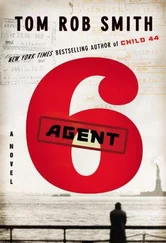Tom Smith - The Secret Speech
Здесь есть возможность читать онлайн «Tom Smith - The Secret Speech» весь текст электронной книги совершенно бесплатно (целиком полную версию без сокращений). В некоторых случаях можно слушать аудио, скачать через торрент в формате fb2 и присутствует краткое содержание. Жанр: Триллер, на английском языке. Описание произведения, (предисловие) а так же отзывы посетителей доступны на портале библиотеки ЛибКат.
- Название:The Secret Speech
- Автор:
- Жанр:
- Год:неизвестен
- ISBN:нет данных
- Рейтинг книги:5 / 5. Голосов: 1
-
Избранное:Добавить в избранное
- Отзывы:
-
Ваша оценка:
- 100
- 1
- 2
- 3
- 4
- 5
The Secret Speech: краткое содержание, описание и аннотация
Предлагаем к чтению аннотацию, описание, краткое содержание или предисловие (зависит от того, что написал сам автор книги «The Secret Speech»). Если вы не нашли необходимую информацию о книге — напишите в комментариях, мы постараемся отыскать её.
The Secret Speech — читать онлайн бесплатно полную книгу (весь текст) целиком
Ниже представлен текст книги, разбитый по страницам. Система сохранения места последней прочитанной страницы, позволяет с удобством читать онлайн бесплатно книгу «The Secret Speech», без необходимости каждый раз заново искать на чём Вы остановились. Поставьте закладку, и сможете в любой момент перейти на страницу, на которой закончили чтение.
Интервал:
Закладка:
The man seemed entirely indifferent to the fact that the ship was now being tossed like a toy by the storm. The entire bunk was rocking: the only thing keeping it fixed was the weight of the people on it. Prisoners were jumping to the floor, scrambling over each other. Leo tried to reason with the man:
— How about we talk when this storm’s over?
— Why? There something you need to do?
— I need to get off this bunk.
— You feel that?
The tip of a knife touched Leo’s stomach.
Abruptly, the ship lifted up, a movement so sudden and powerful it felt as though the hand of a sea-god were underneath them, pushing them out of the ocean and racing them toward the sky. As suddenly the movement stopped, the velocity vaporized, the watery hand turning to spray, and the Stary Bolshevik fell, plunging straight down.
The bow smacked into the water. With the force of a detonation, the impact cracked through the ship. With a synchronized snap every bunk splintered and collapsed. For a second Leo was suspended in darkness, falling, with no idea what lay beneath him. He rotated so that he’d land facedown, pushing his hands out toward the floor. There was a crunch of bones breaking. Unsure whether he was injured, whether his bones had broken, he lay still, breathless and dazed. He didn’t feel any pain. Patting the ground underneath him he realized he had landed on another prisoner, across a man’s chest. The noise had been the man’s ribs fracturing. Leo searched for a pulse, only to find a splintered fragment of wood jutting out of the man’s neck.
As he staggered to his feet, the ship rolled to the side, then back the other way. Someone grabbed his ankles. Worried that it was the nameless, faceless gang leader, he kicked them away, only to realize that it was more likely someone desperate for help. With no time to put right that wrong, the ship rose up again, at an even sharper angle than before, rocketing toward the sky. The smashed bunks, now free to move, slid toward him, piling up. Sharp, lethal fragments pressed against his arms and legs. Prisoners unable to maintain their grip on the sloping floor tumbled down, knocking into Leo, an avalanche of wood and bodies.
Pushed down by the ragged wall of people and timber, Leo tried blindly, hopelessly, to find something to steady himself, something to grab on to. The ship was at a forty-five-degree angle. Something metallic caught him in the side of the face, Leo fell, tumbling, rolling, until he arrived against the back wall, against the hot timber planks that separated the convicts from the roaring coal engine. The wall was four deep with prisoners tipped from their beds, waiting for the ship’s climb to reverse and slip into the inevitable fall. Groping for anything fixed that they could hold on to, they feared being tossed forward into the unknown. Leo clasped the hull — it was smooth and cold. There was nothing to grip. The ship stopped its upward climb, perched on the crest of a wave.
Leo was about to be thrown forward. He’d be helpless, everyone behind him landing on top of him, crushing him. Unable to see anything, he tried to remember the layout of the hold. The steps up to the deck hatch were his only chance. The ship tipped into a freefall, accelerating down. Leo threw himself in the direction where he guessed the steps were located. He collapsed into something hard — the metal steps — and managed to clasp an arm around them just as the ship’s bow thumped into the water.
A second detonation-like impact, the force was tremendous. Leo was convinced the entire ship had split apart, a nutshell smashing under the head of a hammer. Waiting for a wall of water, instead he heard the sound of breaking wood, like tree trunks splitting in half. There were screams. Leo’s arm, locked around the step, was yanked so hard, he was sure it had been dislocated. Yet there was no wall of water rushing in. The hull was intact.
Leo looked behind him and saw smoke. He couldn’t just smell the smoke, he could see it. Where was the light coming from? The noise of the ship’s engine seemed to have intensified. The timber partition separating the convicts from the coal engine had broken apart. The engine room was exposed. At its center was a red, glowing hub surrounded by the smashed debris of bunks and twisted bodies.
Leo squinted, his eyes adjusting from permanent darkness. The hold was no longer secure: the prisoners — the most dangerous men in the penal system — now had access to the crew quarters and the captain’s deck, which could be reached from the engine room. The officer in charge of keeping the engine running, covered in coal dust, raised his hands, indicating surrender. A convict leapt at him, flinging him against the red-hot engine. The officer screamed: the stink of burning flesh filled the air. He tried to push himself free from the metal but the convict held him fast, gloating as the man was cooked alive, his eyes rolling, gurgling on spit. The jubilant prisoner called out:
— Take the ship!
Leo recognized that voice. It was the man on his bunk, the gang leader with the knife, the man who’d wanted him dead.
SAME DAY
FLUNG FROM SIDE TO SIDE, Timur zigzagged down the Stary Bolshevik ’s narrow corridors, colliding with walls, scrambling to secure the two access doors that led up from the engine room. He’d been in the bridge when the ship had dropped from the crest of a wave, as though it had sailed off a crumbling water-cliff, the bow falling for thirty meters before smashing into the base of an ocean-trough. Timur had been thrown forward, catapulted over the navigation equipment, tumbling to the floor. The vessel’s steel panels reverberated with the frequency of a tuning fork, humming with the impact’s energy. Standing up, looking out the window, all he could see was foaming water rushing toward him — churning gray and white and black — convinced that the ship was sinking, plunging straight down to the bottom, only for the bow to be lifted once again, angled toward the sky.
Attempting to ascertain the damage, the captain had rung down to the engine room. There was no response — calls went unanswered. There was still power, the engine was still working, the hull couldn’t have been breached. The upward movement of the ship discounted extensive flooding. If the outer hull was intact the only other explanation for the loss of communication was that the timber partition wall must have snapped like a twig. The convicts were no longer secure: they could enter the engine room and climb the stairs, accessing the main tower. If the prisoners reached the upper levels they’d kill everyone and plot a new course for international waters where they’d claim asylum in exchange for anti-Communist propaganda. Five hundred convicts against a crew of thirty of which only twenty were guards.
Control of the lower levels, those belowdeck, was lost. They couldn’t recapture the engine room or save the crew working in there. However, it was still possible to seal those compartments, trapping the convicts in the lower levels of the ship. From the engine room there were two separate access points. Timur was heading toward the first of the doors. Another group of guards had been dispatched to the second. If either door were open, if either fell into the convicts’ hands, the ship would be lost.
Turning right and left, hurtling down the last flight of stairs, he was at the base of the tower. He could see the first access door straight ahead: at the end of the corridor. It was unlocked, swinging backward and forward, clanging against the steel walls. The ship veered upward, tilting sharply, throwing Timur forward to his hands and knees. The heavy steel door swung open, revealing a horde of convicts climbing up from the engine room, as many as thirty or forty faces. They saw each other at the same time: the door being the midway point between them, both sides staring at each other across the divide between freedom and captivity.
Читать дальшеИнтервал:
Закладка:
Похожие книги на «The Secret Speech»
Представляем Вашему вниманию похожие книги на «The Secret Speech» списком для выбора. Мы отобрали схожую по названию и смыслу литературу в надежде предоставить читателям больше вариантов отыскать новые, интересные, ещё непрочитанные произведения.
Обсуждение, отзывы о книге «The Secret Speech» и просто собственные мнения читателей. Оставьте ваши комментарии, напишите, что Вы думаете о произведении, его смысле или главных героях. Укажите что конкретно понравилось, а что нет, и почему Вы так считаете.












